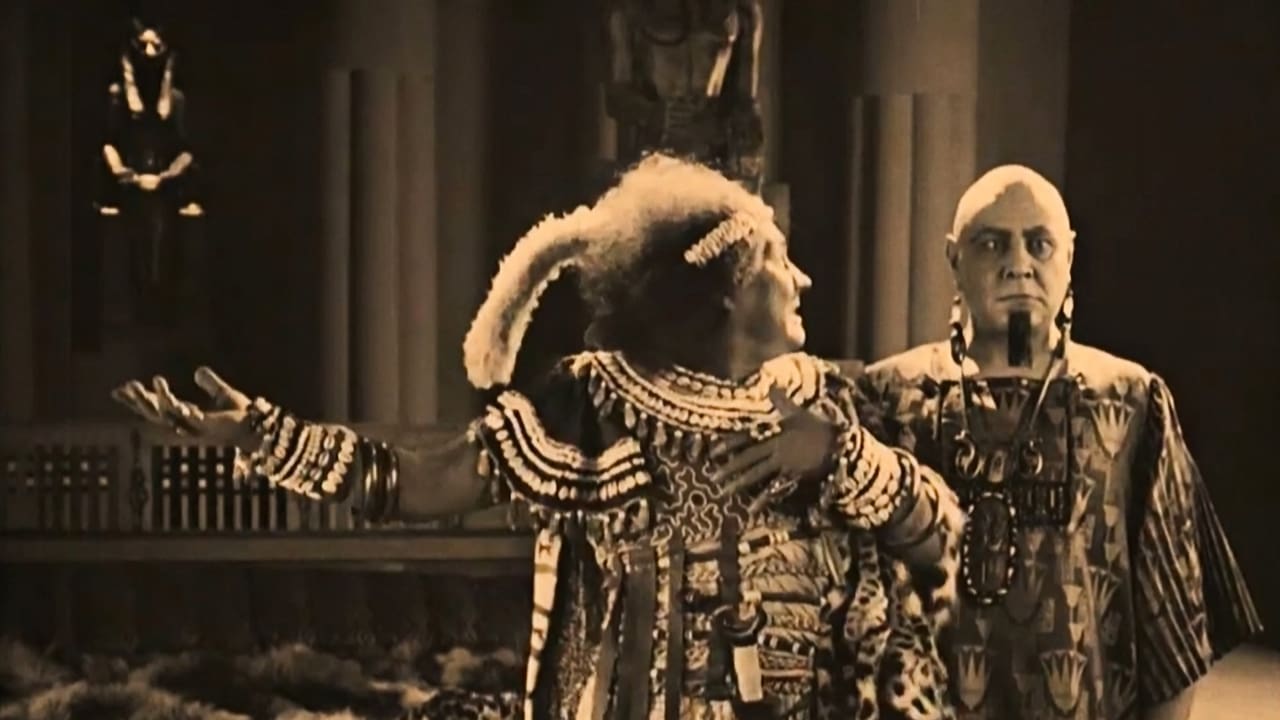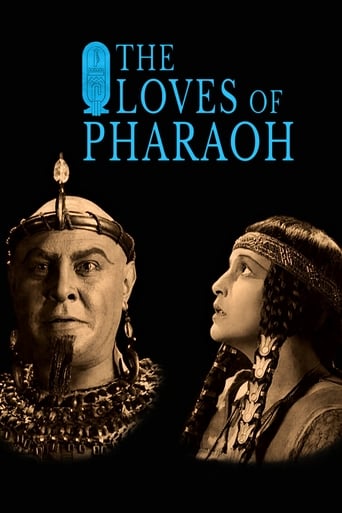Develiker
terrible... so disappointed.
Tockinit
not horrible nor great
SnoReptilePlenty
Memorable, crazy movie
LouHomey
From my favorite movies..
MartinHafer
It is very difficult to adequately judge "The Loves of a Pharaoh" today. Most of this is because the film has been pieced together--much like a jigsaw puzzle that is still missing a few pieces. While the restored film is better than the insane re-creation of "London After Midnight" (where NONE of the original film exists and it is basically just a slide show with intertitle cards to fill in the gaps), it still isn't exactly complete. About a half dozen times during "The Loves of Pharaoh", scenes are missing and intertitle cards and stills are employed. Because of this, I am choosing not to give a numerical score for the film. The story is set in ancient Egypt and I'd sure love to know exactly where it was filmed. According to IMDb, it was filmed in Berlin--but what about the desert scenes with huge dunes--they sure don't look like Berlin!It begins with the king of Ethiopia pledging his daughter to the Pharaoh in order to cement an alliance. However, soon after, the Ethiopian princess' slave, Theonis, is spirited away by the rather dumb Ramphis. When Ramphis and Theonis are caught hiding in the Pharaoh's treasury, they are sentenced to death. But, inexplicably, the Pharaoh is so smitten with Theonis that he agrees to instead send Ramphis to work as a slave and marries Theonis. Considering he doesn't know this woman at all AND marrying her would bring on a war with Ethiopia, Pharaoh's behaviors seem irrational and silly. Just what happens next? See this epic silent and find out for yourself.While the acting and style of the film is rather dated (even compared to other silents), the film is still rather impressive. It features a huge cast, terrific sets and lots of nice costumes. So, while the story is very weak and overly melodramatic, the overall look of the film is nice. Director Ernst Lubitsch clearly created an spectacle here--albeit one with a plot that needed a re-write as much of it just made little sense. Worth seeing once and a chance to see Oscar-winning Emil Jannings in an early film role as the Pharaoh.
drednm
Massive and brilliant restoration of this once-lost film is cause to celebrate. This 1922 epic directed by Ernst Lubitsch boasts massive Egyptian sets, great costumes, a brilliant music score and several great performances.Twisting plot entwines the lives of Pharoah Amenes (Emil Jannings), a Greek slave girl Theonis (Dagny Servaes), a hero Ramphis (Harry Liedtke), and a vicious Ethiopian king (Paul Wegener).After Ramphis steals Theonis from the Ethiopian princess (Lyda Salmonova)and returns to Egypt, the Pharaoh spies her and instantly falls in love. But he's already promised to return the slave girl to the Ethiopian king. Pharaoh takes the woman, but she loves Ramphis. After the lovers are caught in the treasury, Pharaoh condemns Ramphis to slave work in the quarries. But Pharaoh does not return Theonis, so the Ethiopians start a war.Before he goes off to war, Pharaoh walls up Theonis in the treasury and blinds the architect (Albert Bassermann) so no one will find the entrance. Amenes is presumed killed in battle and Theonis, technically Queen of Egypt gets to pick a new Pharaoh and she picks Ramphis. But Amenes is not dead and soon returns to Egypt to find a new Pharaoh installed.Serpentine plot keeps the viewer guessing as the main characters are all bound up in various promises and oaths and star-crossed loves, and no one gets what he wants.Emil Jannings and Dagny Servaes are terrific. While the rest of the cast overacts, it seems fitting for such a sprawling story set against massive Egyptian sets.The restoration of this film ranks among the great restoration projects, and the final result, despite some missing sections, is absolutely amazing. Well worth looking for.
Michael_Elliott
The Loves of Pharaoh (1922) *** (out of 4)Imressive German epic from Ernst Lubitsch about the war that breaks out when an Ethiopian King (Paul Wegener) offers his daughter to a Pharaoh (Emil Jannings) but she then falls his love with one of his servants. THE LOVES OF PHARAOH is a very impressive silent thanks in large part to the wonderful visuals and mammoth sets, which certainly make this rank right up there with the work that D.W. Griffith and Cecil B. DeMille were doing around this same time. I think the most impressive thing is how massive the sets are and how many extras were used during the battle sequences. There are some moments here that make you want to pause the film just so you can get a better look of everything that's going on. The greatest sequence comes towards the end of the picture when we see a giant hill where the camera is pointing straight at it. The action then starts and you see hundreds of people at the bottom of the hill fighting with hundreds more coming from over the hill, down in and into the battle. These scenes are just so big that you can't help but wonder how long it must have taken just to get one shot. The performances are another major plus with Jannings doing an excellent job with the villain. I thought he was extremely believable in the part and he never goes overboard with his madness. I also really enjoyed seeing Wegener here as the "look" from THE GOLEM is still here. Lubitsch does a masterful job at building up all the action but I think the film's one flaw is the screenplay. I never really cared about any of the characters and I found the story to be a tad bit too dull for its own good. Several portions of the film are still missing so photos are put in the missing segments place.
FerdinandVonGalitzien
"Das Weib Des Pharao" (1922) has been one of the most anticipated silent film restorations released in this modernen year. September saw the long awaited premiere of the film which was superbly restored thanks to the efforts of different European institutions. This little known Herr Ernst Lubitsch movie of his German period is now available to the joy of silent film fans around the world. "Das Weib Des Pharao" was the last film directed by Herr Lubitsch before he departed to Amerika where his career was very different in terms of artistic style and goals. Certainly "Das Weib Des Pharao" is characteristic of his work during his Teutonic epoch.First of all, the film is "kolossal": magnificent décors, lavish and gorgeous costumes, crowd scenes astonishing in the number of extras employed. This huge production and Herr Lubitsch's mastery transports the audience back to ancient Egypt.But "Das Weib Des Pharao", spectacular art direction and staging notwithstanding, is also a tormented love story, intimate and nuanced and combining seamlessly with the more spectacular dimension of the plot, the war between the king of Ethiopia Herr Samlak ( Herr Paul Wegener ) and the pharaoh Herr Amenes ( Herr Emil Jannings ). The conflict begins when the king of Ethiopia invades Egypt because his daughter, Frau Makeda ( Frau Lyda Salmonova ) has been rejected by Herr Amenes due to his infatuation with Frau Theonis (Frau Dagny Servaies), namely slave of Frau Makeda. To complicate matters, Theonis is in love with Herr Ramphis (Herr Harry Liedtke). Theonis, against her will, becomes the Queen of Egypt. Tragedy follows for all.This Herr Von was absolutely fascinated during the scenes between the pharaoh Amenes and the beautiful slave Theonis; Jannings' restrained performance shows all the pain and longing of unrequited love as he vainly tries to win her favour. Some of the scenes are in lovely chiaroscuro; the cinematography by Herr Alfred Hansen und Herr Theodor Sparkhul is brilliant."Das Weib Des Pharao" is for this German count a very special Lubistch oeuvre, combining the characteristics of a "kolossal" picture with intimate melodrama. None of the Lubitsch wit is on hand and there is certainly no humor in the film to lighten the story. It remains serious all the way through and is without concessions, making it a very unique Lubitsch film whose rediscovery is a great gift to lovers of the Silent Era. And now, if you'll allow me, I must temporarily take my leave because this German Count has an appointment with his beautiful Teutonic slave instead of one of his fat German heiresses.

